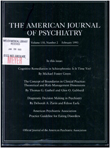Severity of depression and response to cognitive behavior therapy
Abstract
OBJECTIVE: The authors studied the relationship between clinical severity of depression and response to cognitive behavior therapy. METHOD: Fifty-nine outpatients with major depression with endogenous features, according to Research Diagnostic Criteria, were stratified into more severe (score of 20 or more on the Hamilton Rating Scale for Depression; N = 38) or less severe (Hamilton score of 19 or less; N = 21) subgroups. Patients were treated with a 16-week, 20-session cognitive behavior therapy protocol. Outcome was assessed with the Hamilton scale, the Global Adjustment Scale, and the Beck Depression Inventory. RESULTS: The more severe group was significantly more symptomatic across the 16-week protocol and had a significantly lower response rate on the Beck inventory (50% versus 81%). However, the groups did not significantly differ at end point on any of the three measures, and they showed comparable rates of symptomatic improvement (i.e., percent change in scores and interactions between severity classification and time). CONCLUSIONS: These results partially replicate the National Institute of Mental Health's Treatment of Depression Collaborative Research Program's findings of poorer response to cognitive behavior therapy in patients with Hamilton scale scores of 20 or more. However, both groups experienced robust and clinically significant reductions in depressive symptoms, and the response of the more severe patients in the current study could hardly be considered poor. While these findings do not support the view that a Hamilton scale score of 20 or more is a relative contraindication for cognitive behavior therapy, the symptoms of the more severely depressed patients did tend to remit less completely (particularly on the Beck inventory) and thus these patients may benefit from a more intensive or extended course of therapy.
Access content
To read the fulltext, please use one of the options below to sign in or purchase access.- Personal login
- Institutional Login
- Sign in via OpenAthens
- Register for access
-
Please login/register if you wish to pair your device and check access availability.
Not a subscriber?
PsychiatryOnline subscription options offer access to the DSM-5 library, books, journals, CME, and patient resources. This all-in-one virtual library provides psychiatrists and mental health professionals with key resources for diagnosis, treatment, research, and professional development.
Need more help? PsychiatryOnline Customer Service may be reached by emailing [email protected] or by calling 800-368-5777 (in the U.S.) or 703-907-7322 (outside the U.S.).



